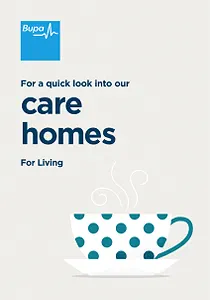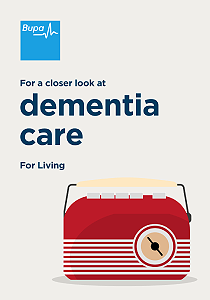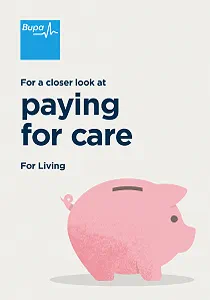Support and advice
We understand that caring for a loved one with dementia can be a stressful experience, but there are things you can do to make it easier.
Giving you extra support and advice, when you need it most.
In the early stages of dementia your loved one may be able to cope well on their own, with limited support. Over time, their symptoms may worsen, requiring more support with everyday life.
We have a selection of information and guides to help you prepare and plan if your loved one needs extra support. These will help you consider the best care options and level of support going forward.
Getting diagnosed
Familiar surroundings and routines
If you’re caring for a loved one with dementia you will know how reassuring familiar surroundings and routines can be. People living with dementia often respond well to routines, as they can help give a sense of meaning and security. This could be anything from eating at a certain time or doing chores such as putting the bins out or washing clothes.
Security and safety
If your loved one wishes to remain in their own home, there can be safety concerns. People with dementia may forget to lock or close doors or lock themselves in if they feel frightened. You may wish to take steps to ensure they are safe, such as giving a spare set of keys to a trusted neighbour, switching from gas to electric cookers and installing smoke and carbon monoxide detectors.
Communication
In the early stages of dementia your loved one may struggle to find the right words to communicate. This can be distressing as the condition progresses, as they may forget names of those close to them or struggle to remember what they’ve said. Although it can be frustrating, it is important to remain calm and answer each question in a reassuring and respectful manner. It can also help to make sure you're in an environment with minimal noise and without too many distractions (e.g. no radio or TV on in the background). As it may take longer for the person with dementia to process the information they hear, it's important to give them plenty of time to respond and remember things. Responding with a positive tone of voice, body language and facial expressions is key.
Day to day activities
Driving
Being diagnosed with dementia does not mean that a person must stop driving, however, safety must be taken into consideration. As their dementia progresses, they will lose the ability to drive safely. As such, it is a requirement for anyone with dementia to inform the DVLA and their insurance company. There is the option to take a driving assessment to see if driving is still a viable option though this will be on a temporary basis. It's also a good idea to look into alternatives to driving so they can still get around.
Help with finances
If you’re caring for a loved one with dementia, it would be a good idea to encourage them to organise their affairs before the dementia progresses too far. This will ensure they have full control of their finances and can select a lasting power of attorney – someone who can manage their financial and legal affairs when they’re unable to. You should also check that you are receiving any benefits you’re entitled to, such as the attendance or disability allowance.
Activities
Taking part in activities is a good way to provide stimulation and help the person living with dementia express themselves, particularly in the early stages of the condition. Encouraging them to continue with hobbies they enjoy can help maintain a sense of self-identity and purpose. How much support is needed will depend on the symptoms and capabilities of the individual, but even activities such as listening to music or painting can have a positive effect.
Eating and drinking
At first your loved one may be fine with preparing their own food, perhaps needing a few prompts around the kitchen. After time they may need more support, as they may forget when they’ve eaten or request strange food combinations. Providing cues such as setting the table and talking about food can make mealtimes easier and less stressful. Reminding them to drink enough fluid is also important. Leaving covered jugs of water or fruit juice next to where they sit will encourage them to drink more.
Read our useful information graphic, which gives some simple steps to help get you started.
Personal activities
Dressing and personal care
Most people are used to taking pride in how they look. Ensuring your loved one still gets to choose what they wear can help them keep a sense of identity and dignity. You can also make it easier by leaving enough time for them to get dressed, laying clothes out in the order they should be put on and modifying clothes with Velcro or elastic so they’re easier to put on.
Washing and bathing
It’s important to talk to your loved one to find out their feelings on the matter; after all they’ve been looking after themselves since they were a child. Needing help with washing and bathing may be embarrassing for your loved one, so try to allow as much privacy as possible. Try to establish what they can still do for themselves, so they can prolong their independence for as long as possible.
Using the toilet
Continence problems can be very distressing for an individual, as it can make them feel like they’re losing control of their dignity. It can be difficult to accept they need help with such an intimate area. In some cases the person may have forgotten where the toilet is, especially if they’re somewhere unfamiliar. Regularly reminding your loved one to go to the toilet can help develop a routine, as well as making the toilet easier to access. It’s a good idea to talk things through with a health professional. This could be the GP, a community nurse or another healthcare professional.
![]()
Rosie’s story
It’s hard to know what’s involved when looking for care. We follow Rosie’s journey and how she helped her mum into a care home. This story is fictional with realistic examples that help to demonstrate how the process works.
Read Rosie’s full storyHelp when you need it
Choosing a care home can be stressful, especially if you've never done it before. Where do you start? Well, right here. Our helpful, understanding care advisers offer free advice on anything from funding to finding just the right home.
Call a customer care adviser on 0345 600 4622^
Ask us to assess your situation and talk to you about paying for care, and how funding works.
Find care homes that might be right for you, and book one or more visits.

^ Lines are open 8am to 6.30pm Monday to Friday, 9am to 12.30pm Saturday. Closed Sundays and bank holidays. Calls are charged at no more than local rate and count towards any inclusive minutes from mobiles. We may record or monitor our calls.






